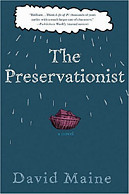
There's nothing new under the sun. Plots are plots. Everything just gets reinvented. This I was told in high school English.
My latest successful reading endeavor is
The Preservationist by David Maine, which is a reinvention of the story of Noah and the ark. Rewriting mythological stories has become a popular idea, though it's not an uncommon one--writers like
Jeannette Winterson,
Piers Anthony, and (my favorite)
Robin McKinley have been reinventing myths and fairy tales for a long time.
The Mists of Avalon by Marion Zimmer Bradley
is a famous and wonderful reseeing of Aruthurian legends, and Margaret Atwood has rewritten the myth of Penelope and Odysseus. I could delve here into questioning just how new or original any of these stories are, how new they can be made. Mostly, I suspect it would become an inspection worthy of a Women's Studies paper, since most retellings seem to focus on previously unconsidered female points of view.
Instead (and for now), I'll stick to the book at hand. David Maine's
The Preservationist tells the story of Noah and his family in the days of ship-building, the flood, and the days after. Just about everyone's perspectives are covered--Noah's, his wife's, and Noah's sons and daughters-in-law. Noah's wife doesn't have a name and is only referred to as "the Wife." Two of his daughters-in-law are from southern and northern tribes; one of them sounds strikingly like a 20th century, almost man-hating feminist, grating under the patriarchy it seems she has just been exposed to, though she had allegedly been married to Noah's son for several years. This isn't the only 20th century-esque bit in the book; there's also the use of "rut" as an alternative to "f---", so you get a lot of "Rut you"s between the brothers. That brought me out of the book quite a bit. And then there are frequent references to literaly rutting (but no details, so don't go paging through the book for smutty sections...
We're not really sure what to think of the characters because we spend so little time in their heads and so much time being told the others' thoughts of them. At some point, two of the sons seem to switch personalities. The most constant characters were Noah himself and his youngest daughter-in-law (who's a bit flaky and though you might think that this wouldn't be difficult to keep consistent, it's actually pretty hard to not make not-so-bright characters suddenly smarter). With the inconsistencies, it would feel like an underdeveloped book in the end, if there wasn't so much "rutting" going on that any more would have become tedious.
Overall, it was an entertaining read, even if I haven't made it sound like it. (Keep in mind that I did finish reading the book.) At least, it was entertaining as long as I didn't think too hard.
